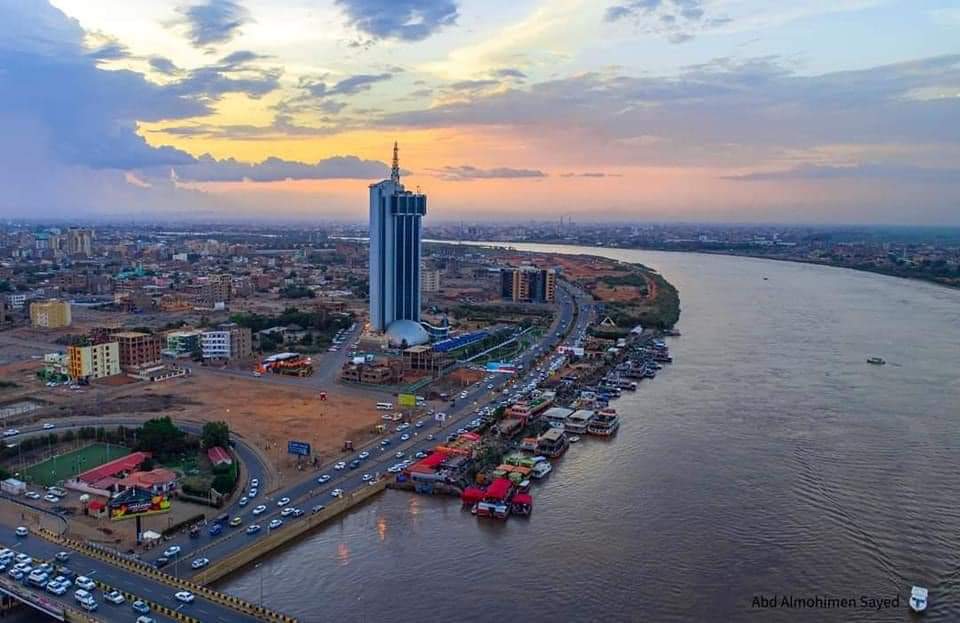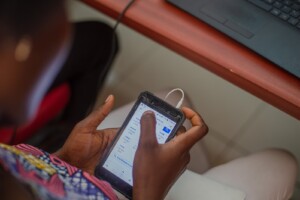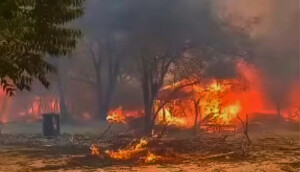Sudan communications blackout widens amid accusations

The telecom tower in Khartoum (File photo: Abd Almohimen Sayed)
The Sudani and MTN telecommunication and Internet networks continued to be cut off across the country for the second day yesterday. Nearly two-thirds of the country’s population is currently unreachable. Zain network went out of service in Port Sudan, Red Sea state. Supporters of the warring Sudan Armed Forces (SAF) and the Rapid Support Forces (RSF) are exchanging accusations over who is behind the cuts.
The management of Sudani telecom company, the main operator of Sudatel group, apologised for “the current network outage” on Saturday, and said its team is working hard to restore services as soon as possible.
The telecommunication and Internet blackout in Sudan has rendered about 65 per cent of the country’s population unreachable. This morning, Radio Dabanga received WhatsApp messages via Zain from parts of White Nile State and from Omdurman, amid rumours about this provider also to be blocked soon. People in Port Sudan are still entirely unreachable.
Large parts of Darfur have been experiencing months-long blackouts, forcing citizens to use Starlink satellite communication network.
The Sudanese Fikra for Studies and Development organisation confirmed “reports of complete mobile and internet blackout in multiple areas in Sudan” in a post on X (formerly Twitter) yesterday. “They’re a lifeline for millions of Sudanese civilians both in and out of the country who depend on it for humanitarian relief and money transfers as a means of survival.
“We call on regional powers and stakeholders to demand and pressure both the SAF and RSF to reverse this decision and not inflict any further pain and terror on civilians. This war is between SAF and the RSF, civilians should not pay the price nor be the collateral for their warring actions.”
The Sudanese American Physicians Association (SAPA) also pointed to the impact on humanitarian aid operations in a statement on X yesterday. “The situation has drastically worsened recently. This blackout directly impacts our humanitarian aid programs, limiting our reach and ability to assist those in need within the areas of our operations.”
Accused
Sudanese are accusing members of the ousted Al Bashir regime, the army, or the RSF of being behind the blackout.
Journalist Mohamed Mustafa stated: “Communication and internet access in the majority of Sudan’s states were blocked by the Janjaweed (aka RSF). Sudanese rely on online banking applications to access their bank accounts after RSF soldiers robbed them of their money and valuables”.
Amjad Farid, director of Fikra organisation, fellow of the European Council on Foreign Relations, and former adviser to the Prime Minister’s Office, accused the RSF of “directly assaulting the main hubs of telecoms companies in Khartoum and ordering engineers to shut off Internet access in various regions of the country at gunpoint.
“There is no justification for the militia’s crimes, and anyone who tries to justify them should keep in mind, if that bothers them, that the communications network is linked to the online banking transfer services on which all Sudanese currently live and receive support from their families, not to mention checking on and communicating with them.
“The fascist RSF militia seems to be perpetrating this crime as a prelude to larger crimes that it plans to commit and conceal behind the veil of a media blackout that uncovered the atrocities it committed in El Geneina and the rest of West and South Darfur.”
According to well-known columnist El Nour Hamed, affiliates of the former Al Bashir regime are behind the blackout. “The communications war, now represented in an Internet blackout, serves criminal purposes.”
He stated on X that “we know the kezan* approach” since the blackout following the violent dispersal of the sit-in in front of the SAF General Command in central Khartoum on June 3, 2019. “The victims of this war are civilians. However, have the kezan, since 1989, cared about how their criminality and greed affect civilians?”
Pro-RSF accounts on X attributed the communications outages to the Sudanese Air Force’s air strikes targeting the main telecommunications tower and server sites in Khartoum.
Radio Dabanga has not been able to obtain confirmed testimony about the accusations or access to representatives of the army or the RSF.
* The word kezan, or kizan, is a pejorative nickname used by many Sudanese for Islamist loyalists to the regime of Omar Al Bashir (1989-2019) and who enjoyed far-reaching privileges during his rule. Kezan is the plural of koz which means ‘wooden or iron mug’. The nickname is based on a description the Islamic Brotherhood called themselves when the founder of the group, the Egyptian Hasan El Banna, said: “Religion is a sea, and we are the mugs that draw from it”.











 and then
and then